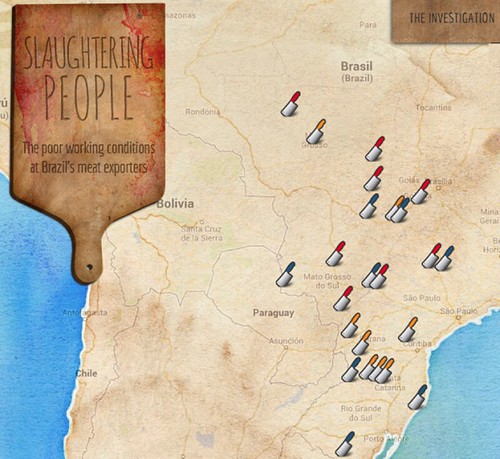Slaughtering People: A Multimedia Investigation into the Global Market of Meat
Daniel Santini & André Campos - June 28, 2013 in Data for CSOs
Slaughtering People is a multimedia investigation into accidents, illness and other problems resulting from working at plants where fowl, swine and bovines are slaughtered. As one of the main segments in Brazil’s agribusiness, meat packing companies account for over 750.000 direct jobs and their exports added up to 15,64 billion dollars in 2011. At the same time, Brazilian meat packing workers face risks in their everyday work – permanent exposure to knives, saws and other cutting tools; repetitive movements that may cause serious injuries and illness; psychological pressure to keep up with the frantic production pace; exhausting workdays that include Saturdays; suffocating work environment; and, of course, cold, a lot of cold. Given these conditions, health problems among workers in meat packing plants are particularly frequent when compared to other industries. To give you some facts, in bovine slaughter there are twice as much head traumas and three times more abdomen, shoulder and arm traumas; in fowl slaughter, the chance that a worker develops mood disorder, i.e. depression, is 3,41 higher; in bovine slaughter, the risk of burnings is six times higher; in fowl and swine slaughter, the risk of injury to the wrist or to the arm’s nerve plexus is 743% higher.
In 2012, the non-profit organization Repórter Brasil conducted a deep investigation into the conditions imposed on the workers of Brazil’s three largest meat exporters: Brasil Foods (BRF), JBS, and Marfrig. This investigation is a continuation of the research that Repórter Brasil conducted in 2011 for the award-winning documentary To the Bone, acclaimed at festivals in Brazil and abroad.
What we found: global connections
Our investigation shows tens of business units sentenced by Justice, shut down, fined or sued for serious problems by labor organisations. It also shows the connections of these three groups to the world’s largest fast-food groups: McDonald’s, Yum! Brands, Subway and Burger King, and to global retailers in the food industry: Walmart, Carrefour, Tesco, Metro, Kroger, Lidl, Costco, Walgreens, Aldi and Target. Here are some of our major findings regarding these connections:
- JBS’s unit in Naviraí, MS, supplies beef to Walmart Brazil’s stores. The intense heat and the foul smell in the slaughter department caused employees to faint.
- Carrefour sells Brazilian meat in the Middle East, including halal food – that is, prepared according to the precepts of the Koran, the sacred book of Islam. In 2011, Labour Justice found BRF’s unit in Dois Vizinhos, PR, guilty of illegal outsourcing and of subjecting to “absolute inhumane conditions” the Muslim workers locally employed in the production of this type of items.
- Corned beef sold under the Tesco brand is made by the Marfrig group in Hulha Negra, RS, where an inspection by labour prosecutors in December 2011 found 12% of local employees on leave for accidents or occupational diseases. Prosecutors heard complaints about the lack of individual protection equipment and a virtually non-stop work pace, which is against the law.
- In Aldi Nord operations, Repórter Brasil found beef under the Tillman’s brand, provided by Marfrig’s meat plant in Bagé, RS. In December 2011, according to labour prosecutors, 112 out of 807 employees of Marfrig in Bagé were on leave because of work-related accidents or illness.
We used maps to show where these problems were identified in Brazil as well as the largest clients (supermarket and restaurant chains) of these Brazilian meat packing groups, such as Walmart.
All the meat companies, retailers and fast-food chains mentioned in our report were invited to speak about the problems found. The statements of those who were willing to speak are available on our website.
Impact and changes in regulation
In May 2013, the Brazilian Government made changes to the regulations related to slaughterhouse working conditions. Now, workers have the right to stop and rest for 10 to 20 minutes a day (which they didn´t before!) and new safety procedures were adopted, meant to help reduce health risks. On that occasion, the National Union of the Food Industry Workers (Confederação Nacional dos Trabalhadores nas Indústrias de Alimentação e Afins, in Portuguese), the main union of the sector, made a public statement celebrating the measure and acknowledging the important role that our investigation had in achieving these changes. (You can read more about this in Portuguese here.)
Steal our work
We released all the results of our investigation under a Creative Commons licence so that anyone can reproduce and use them for free – all we ask is to attribute the information to the Slaughtering People project.
Following the success of this project, we intend to continue to invest time and resources in multimedia journalism. We plan to map more international supply chains in the future, using data tools to show connections and provide insights. If you are interested in this work and have ideas for how it could be expanded or improved or would like to work with us, please get in touch at contato[at]reporterbrasil.org.br.


